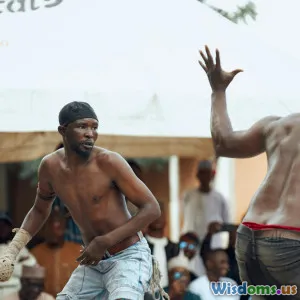
Voices from the Margins: A Literary Perspective
9 min read Explore how marginalized voices shape literature and society in powerful ways. (0 Reviews)
Voices from the Margins: A Literary Perspective
Introduction
Literature serves as a mirror to society, revealing not only the universal human experience but also the voices often overlooked or silenced. While mainstream narratives dominate the literary landscape, voices from the margins encompass stories that are rich in diversity and depth, illuminating the struggles and triumphs of marginalized individuals. Why are these voices so important? This article explores the significance of marginalized voices in literature, the impact of powerful works, and what we can learn from them.
The Importance of Marginalized Voices
Understanding Marginalization
Marginalization in society can take many forms, including racial, sexual, economic, and cultural aspects. These voices have often been sidelined or misrepresented in mainstream books. Literature has the necessary power to not only claim space for these voices but also to challenge and expand the narratives that dominate our cultural discourse.
Historical Context
Historically, marginalized groups — including Black individuals, Indigenous peoples, LGBTQ+ communities, and various ethnic minorities — have faced limitations on their opportunities to share their stories. Writers like Zora Neale Hurston, Toni Morrison, and Chimamanda Ngozi Adichie provide potent examples of how literary creativity has served as a form of resistance and existence. For instance, Morrison's Beloved addresses how the trauma of enslavement shapes individual and collective identity, providing a powerful lens into African American experiences.
Key Authors and Works
Zora Neale Hurston, Their Eyes Were Watching God
The novel by Zora Neale Hurston, published in 1937, is a cornerstone of African American literature. Through the life of Janie Crawford, the protagonist, Hurston delves into issues of race, gender, and personal freedom. Janie's journey explores her struggle for voice and self-identity in a world constrained by societal expectations.
Toni Morrison, Beloved
In Beloved, Morrison takes the painful history of slavery and turns it into a narrative of resilience. The novel addresses haunting themes of motherhood, memory, and historical trauma, making a powerful case for the storytelling capacities of those who have been oppressed. As Morrison wrote, “It is the things that we love the most that destroy us.” This poignant observation gives weight to the complex emotions embedded within the experience of marginalized communities.
Chimamanda Ngozi Adichie, Half of a Yellow Sun
Adichie uses her Nigerian background to shed light on both the beauty and chaos of Nigeria during the Biafra War. The book presents stories that weave through class, ethnic conflicts, and the intersections of gender, providing readers crucial insights into African perspectives often neglected in global dialogues. Adichie's emphasis on storytelling serves not only her characters but also the socio-political landscape surrounding them: “Stories can break the dignity of a people, but stories can also repair that broken dignity.” This encapsulates the healing potential inherent in sharing marginalized narratives.
The Impact on Society
Cultural Representation
The representation of marginalized voices in literature goes beyond mere visibility. It promotes understanding and empathy. For instance, in the USA, recent movements like Black Lives Matter have propelled books by Black authors to significant acclaim, underscoring a desire for truth and representation in narratives that explore race relations. Recent statistics show that books by marginalized authors outsell those dominated by mainstream narratives, demonstrating readers' willingness to engage with diverse stories.
Educational Influence
Marginalized literature is an essential resource in education, exposing students to different realities and comprehensive worldviews. Incorporating books from various authors into school curriculums fosters cultural sensitivity among students, allowing future generations to appreciate and respect diversity. Programs integrating culturally relevant literature report enriched educational engagement and better understanding among peers.
Political Empowerment
Literary works can galvanize movements for change and empowerment. Texts that articulate the plights, histories, and aspirations of marginalized groups can amplify their struggles, garnering allyship and movements for justice. For instance, the narratives found in the works of Elif Shafak and Kiran Desai have sparked discussions around post-colonialism and nationalism. Shafak’s novel The Bastard of Istanbul intertwines Armenian and Turkish histories, highlighting the potential for personal stories to shed light on complex political matters.
Challenges Faced by Marginalized Writers
Market Limitations
Despite the growing recognition, marginalized authors often face significant barriers, including limited access to publishing opportunities, marketing, and distribution. Statistics from the Diversity Baseline Survey conducted by the Lee & Low Books in 2019 revealed that 76% of authors and 79% of publishing staff identify as white, highlighting the systemic inequities still prevalent in the industry.
Misrepresentation
Misrepresentation is another significant challenge. Authors from marginalized backgrounds can encounter pressure to represent their entire community, often resulting in stereotype-laden narratives. This limits the scope for nuance and depth in contributions from within those cultures, creating a homogenization of experiences.
Continuing the Conversation
Supporting Diverse Voices
It is crucial for readers, educators, and publishers to advocate for and support the writing of marginalized voices actively. Independent bookstores and organizations, such as We Need Diverse Books, encourage the promotion of works from underrepresented authors. Additionally, book clubs focusing on diverse literature promote meaningful discussions around these stories, enabling communities to explore their complexities.
Embracing Intersectionality
Future literary explorations must embrace an intersectional perspective, acknowledging that identity is multifaceted. Writers like Salman Rushdie and N.K. Jemisin illustrate this intersectionality powerfully in their works, allowing readers to experience diverse angles of race, gender, culture, and belief systems woven into a single narrative.
Policy Changes
Lastly, advocating for policy changes within publishing—a push for inclusivity and equal opportunities for marginalized voices—requires collective efforts from societies at large. By continually advocating for these changes, along with supporting literature that shines a light on marginalized communities, the literary world may inch closer to representing the diverse society we all inhabit.
Conclusion
The literary perspective of voices from the margins serves as an indispensable part of our broader human narrative. From their rich storytelling to their struggles and victories, marginalized authors invite us to rethink our perceptions of culture and identity, revealing complex truths about humanity. Embracing these voices only deepens our understanding of the world and encourages an enriched dialogue reflecting the realities of all peoples. It is our responsibility as readers, advocates, and allies to ensure that marginalized voices are not just heard but celebrated in an evolving literary landscape.
By supporting and prioritizing these narratives, we create space for diverse experiences to flourish and enable a more comprehensive view of our collective identity. In doing so, we can awaken the beauty of true inclusivity — invoking literature’s timeless power as a vehicle for change.
Rate the Post
User Reviews
Popular Posts





















